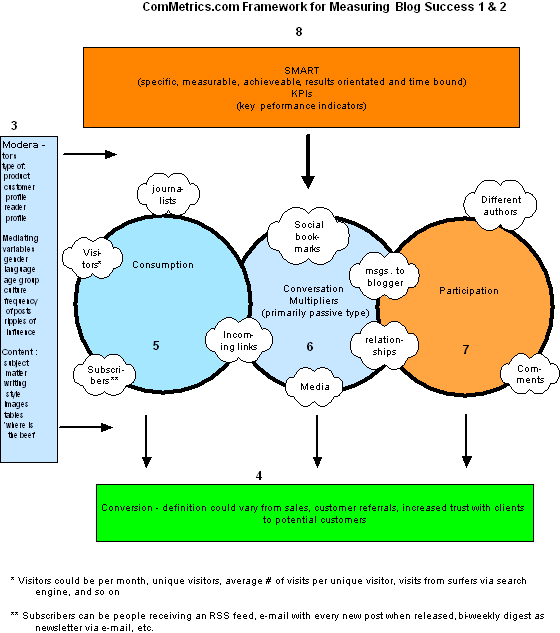What matters is reaching the right people by the right means.
A short while back we started this series with:
It is obvious that instead of measuring quantity, we have to measure quality. Only when we do that will the true value of our blogging efforts come through.
In turn, we need to start with problems and then seek solutions. Alternatively, put differently, how can the blog help to solve what kind of problem or challenge we must deal with? Does it serve or can it serve a particular need customers might have?
The ComMetrics.com framework for measuring blogging success or the success of your blog is a conceptual start. It helps us move down the path toward a more effective and fair assessment of benefits that can accrue by blogging.
At this point, I provide you with a general overview of the figure below. In subsequent posts, we provide a more detailed discussion of each part of the model below and its implications.
SMART KPIs are part of the thing we need to satisfy investors and corporate decision-makers. To the left of the graph (light blue rectangle), we put in moderating, mediating and other variables. Looking at how these may affect results when reporting KPIs and your blog’s success is important.
The figure below benefited from the early work by Greg Verdino. We expanded his framework and included a few more concepts and ideas but thanks Greg for getting me going.

If you cannot view the above, get clear image here: ComMetrics.com framework for measuring blogging success
In business, if blogging does not have an effect upon the cash register in one way or the other (see green rectangle) we have a problem.
As future discussions will show, the focus of a blog can be vastly different. For instance
shows a blog regarding a person’s effort to report about life in Saudi Arabia, particularly, those news traditional media did not touch for political reasons. Fouad al-Farhan could have taken a Brand Me route and blogged about IT issues, thereby helping his business prosper. He wanted to support efforts to improve transparency of government actions, a vital process in a working democracy. This did neither improve his wealth nor his firm’s ROI. In fact, it got him jailed.
Others may blog for their own pleasure or they might promote themselves and their employer as this example suggests:
– Occam’s Razor by Avinash Kaushik
Avinash is a Google employee. He is the spokesperson for web analytics, one of Google’s products. In a different position is Guy Kawasaki who blogs as an entrepreneur and what you see is what you get:
In contrast to al-Farhan’s blog as well as Avinash Kaushnik and Guy Kawasaki is the Avvo.com website launced in early summer 2007.
A a lawyer who manipulated the system to demonstrate how easy it was to get a better ranking for himself took the firm to court. The lawsuit gave the web site the media attention needed to get more lawyers to register. As well, it brought an increase in traffic by people searching for a lawyer using the Avvo.com rankings to make a better choice. In a litigious society such as the U.S., Avvo.com is a business that serves a potential need. Namely, people wanting information about a lawyer before going to talk to her about a problem they have.
Quick Tips
A) The purpose of your blog pre-sets the choice and type of success measures that you must use.
So is it just for pleasure, to push your own business and/or help your employer or maybe all of these? The more purposes a blog must satisfy, the more challenging it will be to reach performance targets.
B) What are you trying to sell?
Blogging about green technology such as solar collectors is one thing. Very different is the situation, where a real estate professional uses a blog to promote and grow his business (e.g., Gerry Vazquez, Bethpage, NY).
Blogging for an online business on eBay is surely a different kettle of fish than blogging for solar collectors or a real estate business. Unfortunately, most people imply that everybody sells their service online with a blog… or an e-commerce site = clinch the deal online. Come again, the real world does not work this way in all industries.
Have you ever sold or purchased engineering services using an e-commerce site? Industrial buyers do not behave the same way grandma does when going shopping – and no its not just that the one purchases 50 TVs and the other one. It is also how they go about it.
We will continue discussing these measurement issues and challenges about how to use blogging metrics next week.
============>
If this post was helpful to you, please consider stumbling it or subscribing to feeds from CyTRAP Labs. Cheers.
==========>
Also of interest:
– 1 sensible metrics – how to measure success of a blog – the basics
==========>
Comments on this entry are closed.